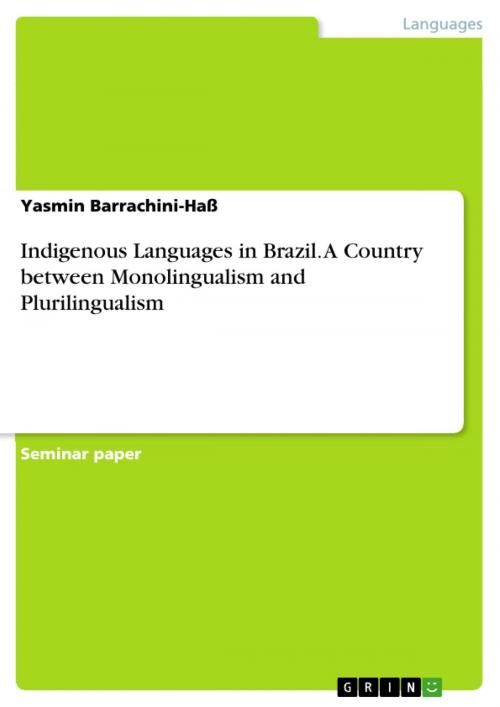Indigenous Languages in Brazil. A Country between Monolingualism and Plurilingualism
Nonfiction, Reference & Language, Language Arts, Linguistics| Author: | Yasmin Barrachini-Haß | ISBN: | 9783668198067 |
| Publisher: | GRIN Verlag | Publication: | April 15, 2016 |
| Imprint: | GRIN Verlag | Language: | English |
| Author: | Yasmin Barrachini-Haß |
| ISBN: | 9783668198067 |
| Publisher: | GRIN Verlag |
| Publication: | April 15, 2016 |
| Imprint: | GRIN Verlag |
| Language: | English |
Seminar paper from the year 2012 in the subject Speech Science / Linguistics, grade: 1,0, University of Bremen, course: Sprachpolitik, Sprachenrechte, Sprachplanung, language: English, abstract: This paper mainly focuses on indigenous languages, indigenous laws and rights, as well as indigenous education. The first chapter deals with indigenous peoples in Brazil, their geopolitical situation, their languages and linguistic prejudices towards them. The second chapter focuses on how indigenous languages are promoted. This includes how indigenous school- and university programs have evolved in the last centuries and especially in the last decade and how didactic materials have also improved. Finally, a conclusion is drawn, followed-up by the list of sources and declaration about the authenticity of this term paper. Brazil is, generally speaking, a country of diversity. It is not only known to have the planet's largest remaining rainforest and wildlife, but it is also known to be rich in culture. It must also be said that it has always been a migration country. Thus, in the last five centuries people from all over the world immigrated to Brazil and brought foreign rituals and traditions with them, which eventually also enriched the Brazilian culture. However, before becoming a Portuguese colony in 1500 Brazil was already inhabited by many indigenous peoples. The majority of them had been extinct through the colonization process, but even after that indigenous people had to struggle and fight for their lives. Sadly, this condition remains to be true nowadays. Although Portuguese is the official and most spoken language in Brazil, there are also about 215 other languages that are spoken in this country (Müller de Oliveira: 2009; p. 20). Most of those languages are spoken by indigenous peoples. Thus, Brazil can undoubtedly be considered to be multilingual. This vast linguistic variety, however, is neither promoted nor apprehended properly by the Brazilian government, although there are laws to protect it. Paradoxically, Brazil has always had a Monolingualism- oriented policy. Nevertheless, there are increasingly more parties, as for instance the NGO 'Amazon Watch' and 'Survival' as well as the Brazilian governmental protection agency 'FUNAI', which interest it is to protect the indigenous' cultural diversity, including their languages.
Seminar paper from the year 2012 in the subject Speech Science / Linguistics, grade: 1,0, University of Bremen, course: Sprachpolitik, Sprachenrechte, Sprachplanung, language: English, abstract: This paper mainly focuses on indigenous languages, indigenous laws and rights, as well as indigenous education. The first chapter deals with indigenous peoples in Brazil, their geopolitical situation, their languages and linguistic prejudices towards them. The second chapter focuses on how indigenous languages are promoted. This includes how indigenous school- and university programs have evolved in the last centuries and especially in the last decade and how didactic materials have also improved. Finally, a conclusion is drawn, followed-up by the list of sources and declaration about the authenticity of this term paper. Brazil is, generally speaking, a country of diversity. It is not only known to have the planet's largest remaining rainforest and wildlife, but it is also known to be rich in culture. It must also be said that it has always been a migration country. Thus, in the last five centuries people from all over the world immigrated to Brazil and brought foreign rituals and traditions with them, which eventually also enriched the Brazilian culture. However, before becoming a Portuguese colony in 1500 Brazil was already inhabited by many indigenous peoples. The majority of them had been extinct through the colonization process, but even after that indigenous people had to struggle and fight for their lives. Sadly, this condition remains to be true nowadays. Although Portuguese is the official and most spoken language in Brazil, there are also about 215 other languages that are spoken in this country (Müller de Oliveira: 2009; p. 20). Most of those languages are spoken by indigenous peoples. Thus, Brazil can undoubtedly be considered to be multilingual. This vast linguistic variety, however, is neither promoted nor apprehended properly by the Brazilian government, although there are laws to protect it. Paradoxically, Brazil has always had a Monolingualism- oriented policy. Nevertheless, there are increasingly more parties, as for instance the NGO 'Amazon Watch' and 'Survival' as well as the Brazilian governmental protection agency 'FUNAI', which interest it is to protect the indigenous' cultural diversity, including their languages.















